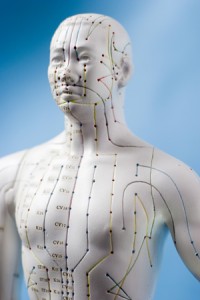by Jolin Brandes —
The practice of qigong can yield many benefits and assist you in taking back the power to heal yourself. During the winter season, when you are susceptible to colds and flu-like symptoms, qigong is an excellent therapy to help support your lungs.
Qigong encourages a positive outlook on life and can help you eliminate harmful attitudes and behaviors. It also helps create a balanced lifestyle, which ultimately brings you greater harmony, stability and enjoyment. In traditional Chinese medicine, it is said that the two reasons for disease in the body are blockages of qi flow in the meridians and blockages in the blood. Practicing qigong opens up these blockages and assists in balancing the body.
When you get a chest cold or flu symptoms, blockages in the meridian flows occur. The lungs and the large intestines are known as the “air elements” in Chinese medicine. In essence, their energies interact with each other — one is yin and the other, yang.
Your mental/emotional body plays a large role in any disease state you may experience physically. If you hold on to an emotional state for a period of time, your qi flow gets blocked along the energetic meridian that brings energy to the lungs and large intestines. This is when you may begin to experience symptoms of ill health.
The primary function of the lungs (yin energy of the air elements) is the act of breathing. Qi stagnation within the lungs can cause chronic emotional turmoil, which may eventually manifest in an outburst of crying or sinking into deep despair. The lungs govern emotions of the present and influence your breath, skin, large intestines, mucous membranes, body hair, smell and metabolism of the body fluids and the Po (the corporeal soul that is associated with the lungs, which is the aspect of consciousness that dissolves with the elements of the body at the time of death).
The right lung stores grief and sorrow caused by men, and the left lung stores grief and sorrow caused by women. Some of the negative emotional attributes that have to do with the lungs are disappointment, sadness, grief, despair, shame and sorrow. Some of the positive emotional attributes of the lungs are dignity, integrity and healthy self-esteem.
When the qi energy of the lung meridian is open and flowing, the lungs build more strength, and thus a stronger base of these positive attributes, with the benefit of a stronger and more balanced lung capacity.
There are 11 acupoints along the lung meridian that originate from the shoulder, on down the top inside of the arm and to the outside of the thumb. When some of these points are blocking the qi flow to the lungs, the following symptoms may occur: pulmonary/respiratory disorders, asthma, bronchitis, chest discomfort, cough, nasal congestion, shoulder pain, insomnia, throat infections, wrist pain, headaches, toothache, sadness, worry, arm pain and more.
Acupuncturists work to assist you in relieving these symptoms by opening up the qi flow along those acupoints to bring you back to health and well-being. But by also including a practice of qigong daily, you can heal yourself.
Stories abound from people who have found relief and many who have achieved full recovery from symptoms by incorporating qigong into their daily exercise routine.
We hope that the information about qigong provided here has given you a new perspective on the cause of mental/emotional/physical imbalances, so that you can work to create a positive change in your well-being and take back the power to heal yourself. Have a blessed spring full of laughter, joy and love.
Jolin Brandes is with Transformational Energies in Phoenix. 480-643-0883 or www.src4u.com.
Reprinted from AzNetNews, Volume 31, Number 1, Feb/Mar 2012.






March 1, 2012
Acupuncture, Exercise, Natural therapies, Qigong